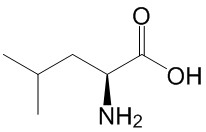Home
Products
L-Leucine



| Product Name | L-Leucine |
| Price: | $12 / 20mg |
| Catalog No.: | CN00903 |
| CAS No.: | 61-90-5 |
| Molecular Formula: | C6H13NO2 |
| Molecular Weight: | 131.2 g/mol |
| Purity: | >=98% |
| Type of Compound: | Alkaloids |
| Physical Desc.: | Powder |
| Source: | The cultures of Corynebacterium glutamicum. |
| Solvent: | DMSO, Pyridine, Methanol, Ethanol, etc. |
| SMILES: | N[C@H](C(=O)O)CC(C)C |
| Contact us | |
|---|---|
| First Name: | |
| Last Name: | |
| E-mail: | |
| Question: | |
| Description | L-Leucine is an essential branched-chain amino acid (BCAA), which activates the mTOR signaling pathway[1]. |
| Target | mTORC1 |
| In Vitro | L-Leucine (10 mM) treatment impairs endocrine progenitor cell development[1]. In E13.5 rat pancreatic explants, in absence of added L-Leucine, Ngn3 mRNA levels increased after 1 day of culture, peaked on day 3, and then decreased. When L-Leucine is added, a dramatic decrease is observed in Ngn3 mRNA levels. This decrease in Ngn3 mRNA levels was paralleled by a decrease in the number of Ngn3-expressing cells (4728±408 vs. 959±28; P<0.01). Finally, L-Leucine also caused a dose-dependent repressive effect on the mRNA levels of the three genes, namely Ngn3, its target Insm1, and insulin[1]. Leucine stimulates protein synthesis in skeletal muscle of neonatal pigs by enhancing mTORC1 activation. L-Leucine increases intracellular HIF-1α levels and activates the HIF-1α signaling pathway, and these two effects are mediated by the mTOR signaling pathway. This process results in Ngn3 repression and, consequently, decreases β-cell differentiation[1]. |
| Density | 1.0±0.1 g/cm3 |
| Boiling Point | 225.8±23.0 °C at 760 mmHg |
| Flash Point | 90.3±22.6 °C |
| Exact Mass | 131.094635 |
| PSA | 63.32000 |
| LogP | 0.73 |
| Vapour Pressure | 0.0±0.9 mmHg at 25°C |